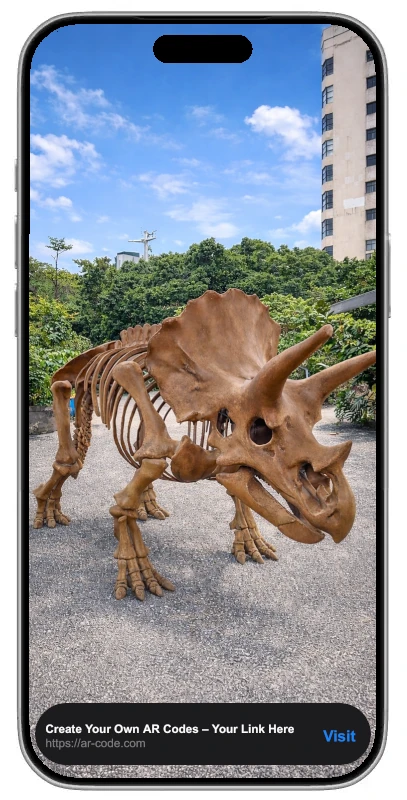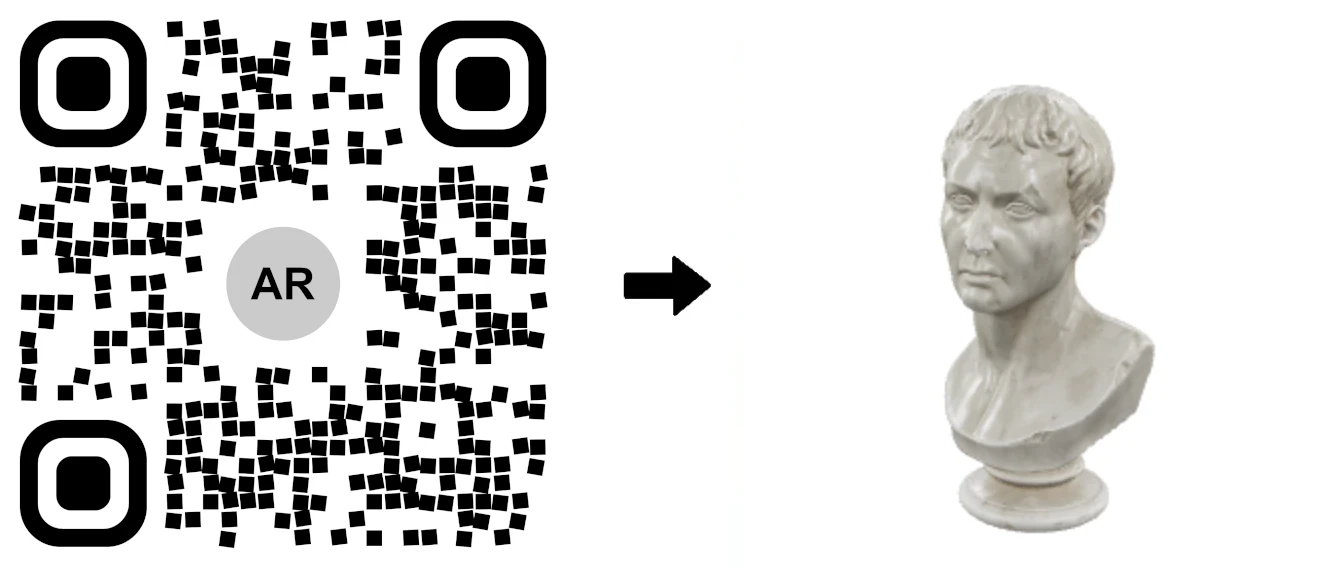Digital Transformation of Museums with AI QR Codes
AR Code Tech | 04/02/2026 |
In today’s digital era, museums and cultural organizations are transforming visitor experiences with powerful Augmented Reality (AR) and Artificial Intelligence (AI) solutions. AI AR Codes are leading this evolution, allowing businesses to create interactive, personalized engagements that attract and retain audiences. The AR Code SaaS platform delivers innovative tools to elevate exhibitions and expand your business reach with immersive AR technology.
What are AI Codes?
AI Codes go beyond QR Codes and standard AR Codes by integrating Artificial Intelligence and Augmented Reality. When users scan an AI Code, they instantly access AI-driven content that interprets and enhances the understanding of artworks and exhibits, delivering memorable and immersive experiences.
The AR Code platform features an exclusive 'AI Code Prompt Generator.' This intuitive tool empowers curators, educators, and marketers to build custom prompts, ensuring meaningful and engaging interactions with visitors.
Optimize your AI Code initiatives by customizing prompts and the "Call AI" button text. Each visitor receives a personalized, interactive experience tailored to their needs.

Example prompt: Analyze the image and identify the painting shown. Describe its artistic style and likely historical period. Identify the artist, title, and year if possible. If the painting is not found, suggest retaking the photo to include the artwork.
How AI QR Codes Drive Museum Visitor Engagement

Museums are using AR Code and AI QR Codes to turn traditional exhibits into interactive digital learning experiences. With AR Code SaaS, cultural institutions deliver immersive experiences that increase visitor satisfaction and loyalty.
- Interactive Learning: Enable visitors to use their smartphones to scan AI Codes for multimedia insights, artist commentary, and stories, boosting engagement.
- Personalized Tours: Offer tailored recommendations based on scanned items to enhance visitor journeys and encourage repeat attendance.
- Multilingual Accessibility: AI Codes automatically translate and localize content, welcoming international audiences.
Business Applications: AR and AI Codes in Museums
Adopting AR Code’s AI-powered solutions improves learning, accessibility, and visitor satisfaction, setting your institution apart in the industry.
- Deeper Art Appreciation: Provide instant background knowledge, restoration insights, and artistic context through AR and AI Codes.
- Augmented Educational Content: Engage students and families with AR quizzes, games, and challenges. Increase learning outcomes and repeat engagement. Explore AR Codes in Education for more ideas.
- Preservation & Virtual Access: Use AR to showcase rare collections digitally, increasing access and protecting valuable artifacts.
Integrating AR Code SaaS increases visitor engagement, promotes cultural preservation, and delivers interactive onsite and remote learning. Discover more AR Code applications for museums at AR Code for Museum Innovation.
The Future of Museums with AR and AI Code Integration
Progressive museums and cultural organizations are leveraging AR Code and AI to deliver immersive, data-driven digital experiences, growing audiences and building leadership in digital storytelling.
Enhance learning and engagement by creating interactive 3D models of museum exhibits with AR Codes. Our new AR GenAI solution allows you to generate a 3D AR experience from a single photo of an object, making it easier than ever to showcase collections digitally.
AI Codes bring customized, insightful content to every visitor, offering tailored tours, advanced learning, and competitive differentiation for museums and galleries.
With AR Code SaaS, institutions extend their reach beyond the physical venue. Enable global engagement, deliver accessible digital experiences, and bring cultural stories to life with interactive AR content.
Conclusion
AR Code’s AI Codes and SaaS platform empower museums and cultural businesses to deliver modern education, high-impact marketing, and captivating storytelling. These digital solutions grow audience loyalty, accelerate your organization’s digital transformation, and establish your brand as an industry leader. Enhance your digital strategy and deliver exceptional visitor experiences with AR Code SaaS for museums.
Frequently asked questions
How do AI QR Codes improve upon traditional QR Codes?
AI QR Codes advance traditional QR technology with powerful AR and AI. Visitors enjoy personalized, interactive content that increases engagement and provides greater value for museums and businesses. Learn how to use them at How to Scan AR Codes.
How do AI Codes make museum visits better?
AI Codes transform museum visits into immersive, expert-guided experiences. Guests receive real-time analysis, personalized recommendations, and multilingual support, resulting in lasting engagement at every exhibit.
What are some uses of AI Codes in museums?
AI Codes elevate visitor interaction with art, provide AR educational games, and enable digital access to rare pieces. They foster collaboration, broaden global reach, and help your museum lead in digital innovation.
What does the future hold for museums using AR and AI technologies?
Museums deploying AR and AI technologies will offer immersive, accessible, and global experiences. Stay ahead in digital cultural engagement by exploring AR Code for Museums.
AR Code Tech - Latest Blog Posts
AR GenAI: Turn a Single Photo into an AR-Ready 3D Model

Unlock the power of AR GenAI, the groundbreaking Image to 3D solution from AR Code, now live within the AR Code SaaS platform. With AR GenAI, businesses can convert a single product photo into an interactive 3D model for instant display in Augmented Reality. There is no need for app downloads, 3D scanning, or expert...
AR Splat: A New 3D Scanning-to-Augmented Reality Solution Based on Gaussian Splatting

AR Splat by AR Code is the all-in-one SaaS solution for businesses seeking fast, immersive 3D content creation through web-based augmented reality. By uploading a simple walk-around video, AR Splat instantly generates a photo-realistic 3D scene using cutting-edge Gaussian Splatting technology. Each 3D scene is...
AI Code’s Image Generation Redefines Product Visualization Through a QR Code Scan

AR Code revolutionizes Augmented Reality (AR) and Artificial Intelligence (AI) for businesses with instant AI-generated visualizations accessible through a simple QR code scan. Maximize engagement with AI Code for your business and boost customer interaction using immersive, web-based AR experiences on any...
AR Code Object Capture Now Works on All iPhones and iPads No LiDAR Required
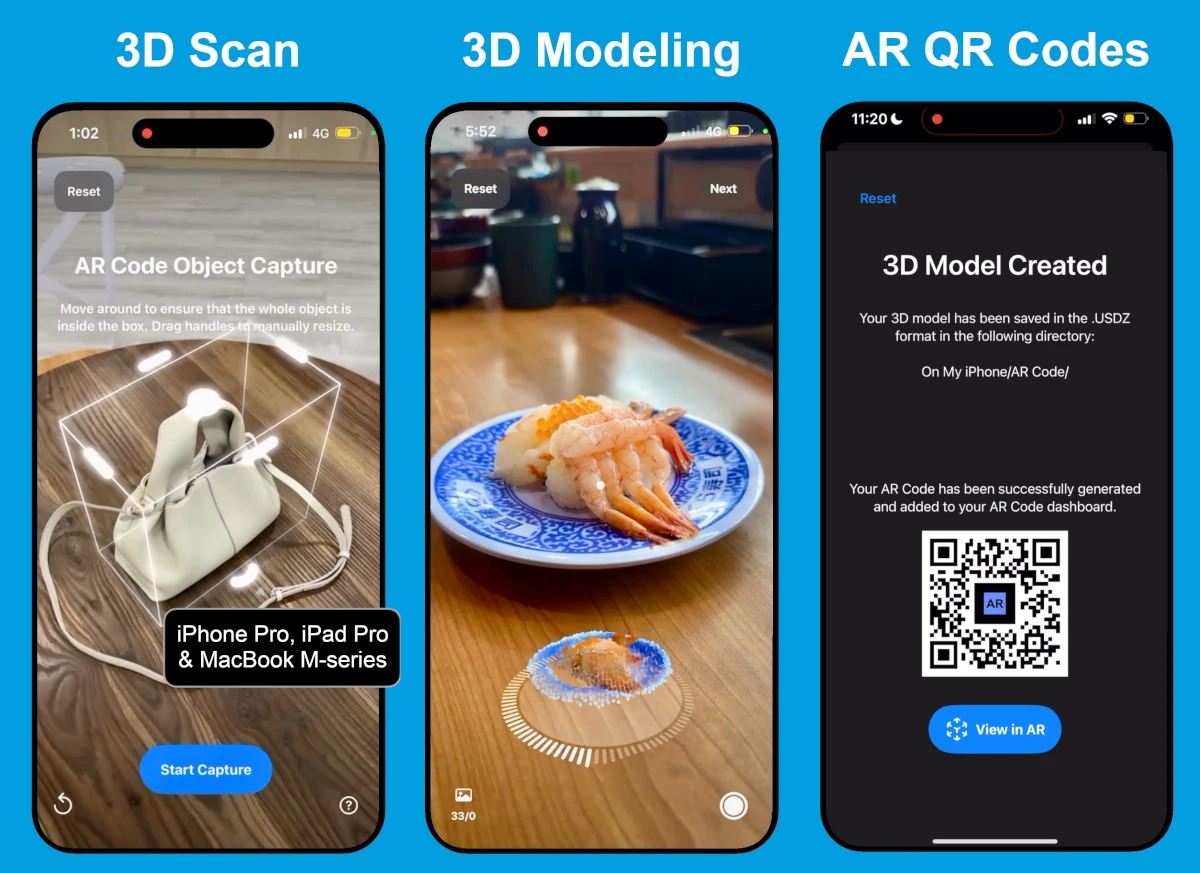
Supercharge your business with immersive augmented reality using the AR Code Object Capture app. Seamlessly capture and create 3D models along with AR QR Codes on any iPhone or iPad—no LiDAR necessary. Simplify digital workflows, boost customer engagement, and deliver interactive AR marketing, support, and product...
3D Scanning from Video Now Available on the AR Code Web Interface
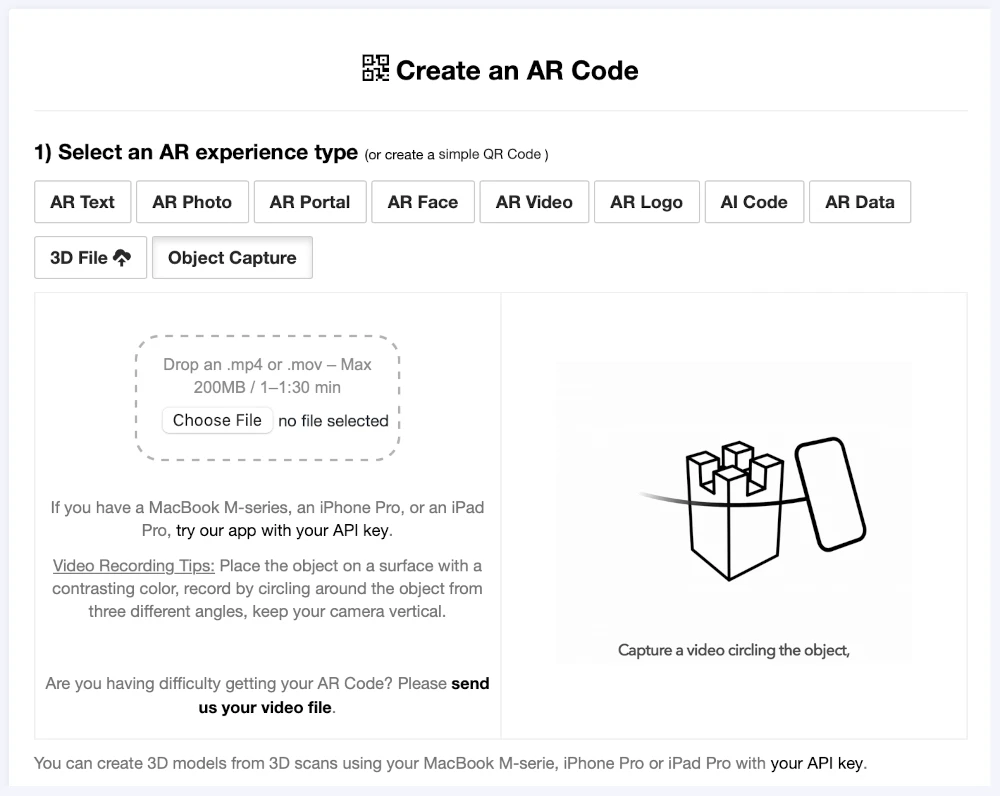
Accelerate your business growth with the powerful AR Code Object Capture solution, seamlessly available on our web platform. Instantly generate immersive augmented reality content from video-based 3D scans, driving brand engagement and digital transformation in minutes without technical barriers. ...
Guide to 3D Scanning with Our "AR Code Object Capture" Solution

Accelerate your business’s digital transformation with AR Code Object Capture, a powerful SaaS platform for 3D scanning and immersive augmented reality experiences. Trusted by leading organizations, AR Code delivers precise 3D model creation for marketing, e-commerce, manufacturing, and engaging product demos....
From Video to 3D Modeling: Photogrammetry with AR Code Object Capture on MacBook M-Series
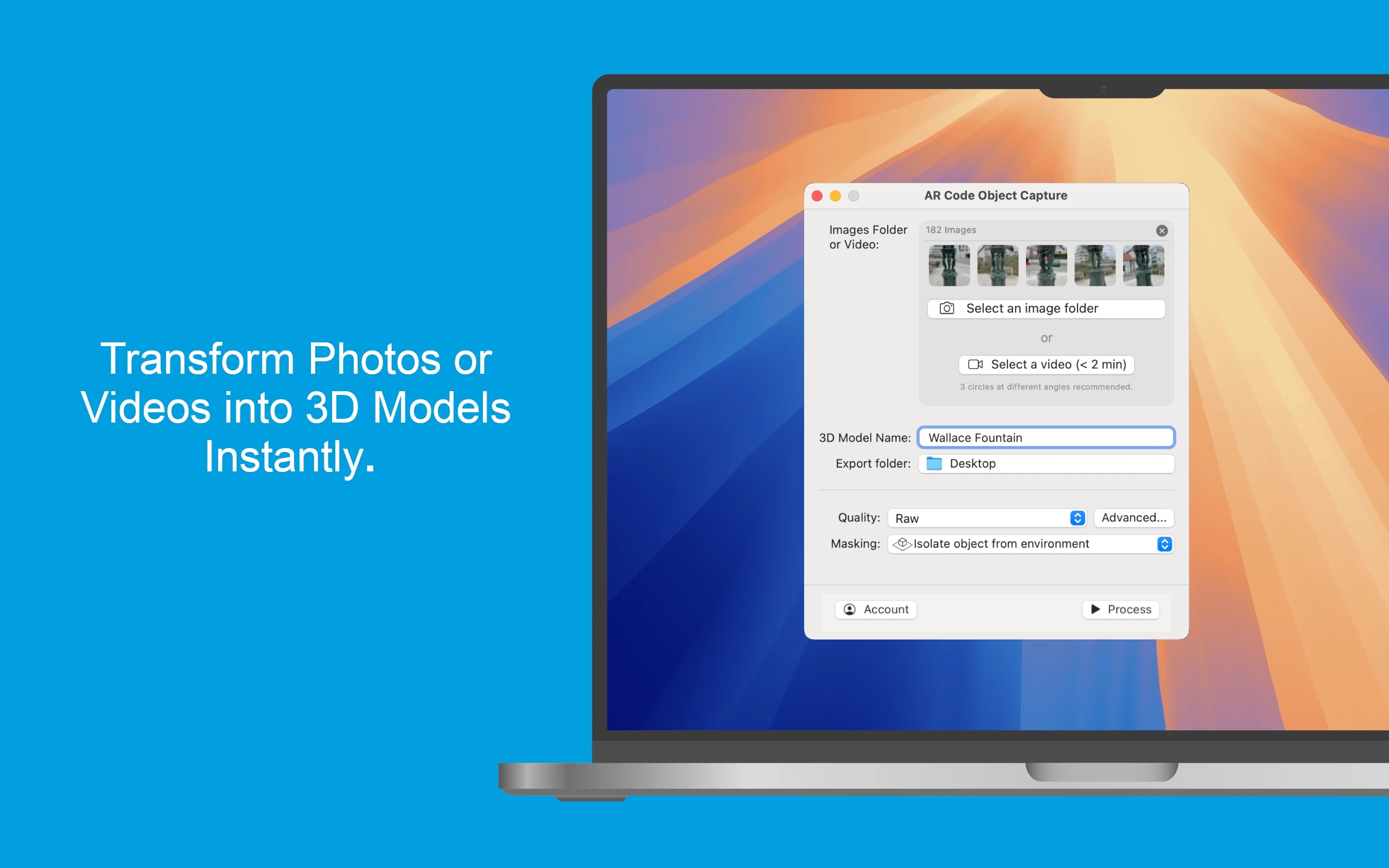
Empower your business growth with the innovative AR Code Object Capture app, the ultimate 3D scanning and augmented reality SaaS platform for enterprises. Purpose-built for MacBook M-series (macOS 15.0+), this app transforms physical products into engaging 3D models and AR QR Codes within minutes. Effortlessly sync...
Personalize Your AR Codes with Innovative Design Options
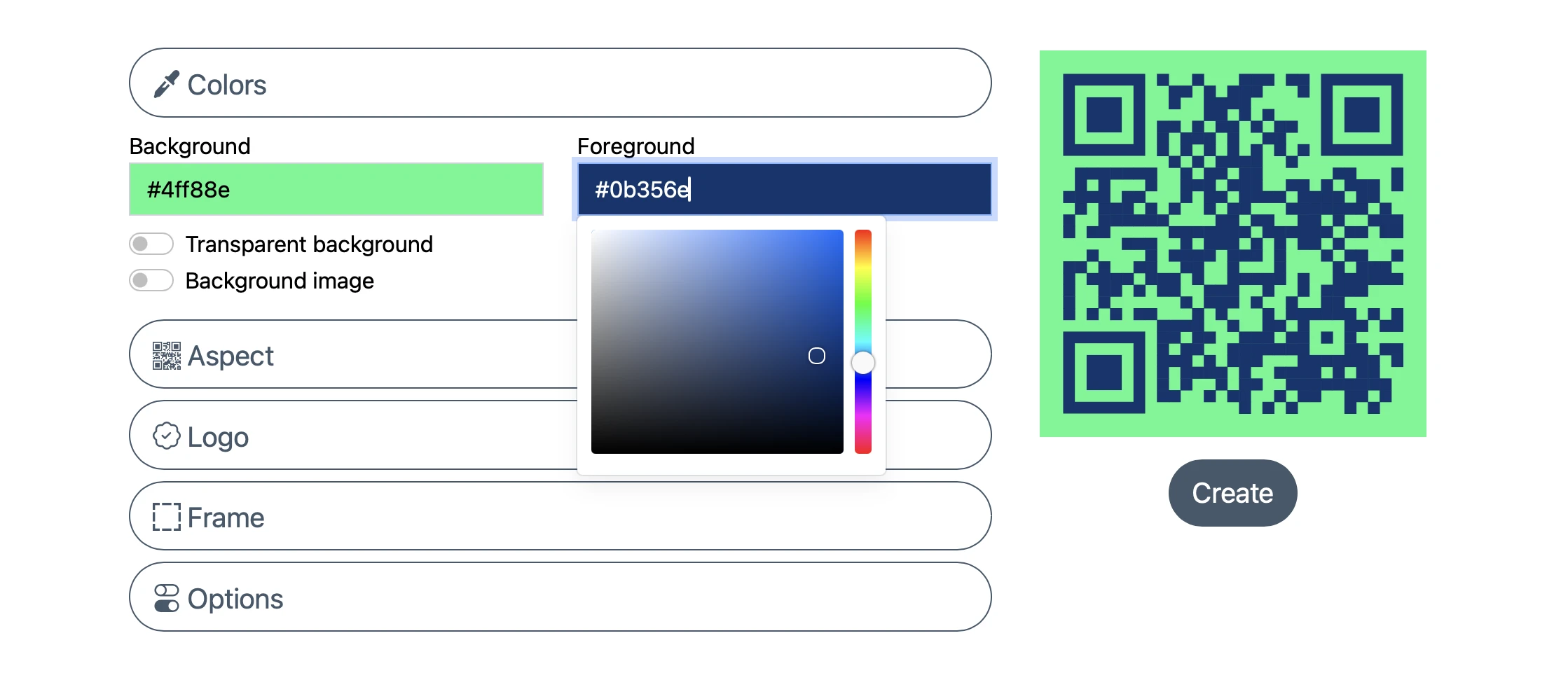
AR Codes are transforming how businesses engage customers by bridging physical products, printed materials, and digital content into dynamic augmented reality experiences. On the AR Code SaaS platform, AR Codes go beyond traditional QR codes with advanced visual customization. These next-generation codes become...
AR Code's Low-Power SLAM: Augmented Reality for Everyone, Everywhere

Accelerate your business growth with AR Code, the leading SaaS platform for web-based Augmented Reality. AR Code empowers companies to deliver dynamic AR experiences accessible on any device, from premium smartphones to budget Android models. Using advanced low-power SLAM (Simultaneous Localization and Mapping)...
Revolutionize Your Online Boutique with 3D Scans Using the AR Code Object Capture App

In today's evolving e-commerce market, delivering immersive, interactive shopping is essential for brands to thrive. Shoppers now expect to experience products virtually as vividly as in-store. AR Code empowers businesses to exceed expectations with cutting-edge Augmented Reality solutions. Through the intuitive AR...
164,246 AR experiences
578,196 Scans per day
132,837 Creators


